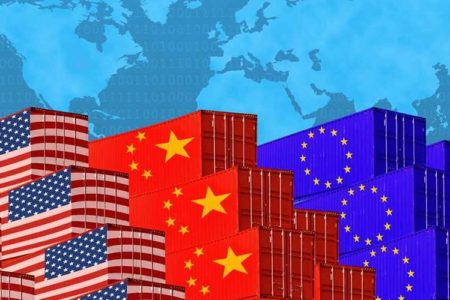August 25, 2019 – The world’s largest economies are meeting in Biarritz, France this weekend under the banner of the G7 to discuss shared issues of global importance. The three outliers at this meeting are the United States, the United Kingdom, and China.
Under Donald Trump’s presidency the United States has adopted an America First response to global issues. What’s good for the USA is all that matters to this president and his weak grasp of supply chains, global trade and the imposition of tariffs.
In an escalating economic war with China using ever increasing tariffs on goods being imported from that country, he is disrupting American businesses that from 1990 to 2010 established relationships with suppliers across the globe as international trade agreements and low tariffs made it cheaper to use Chinese labour to manufacture products, and maritime shippers to bring them to America’s shores. Global supply chains by 2010 were producing 70% of all international commerce with American consumers the beneficiaries of low prices and just-in-time efficiency in delivery.
In the United Kingdom(UK), a narrowly one vote to leave the European Union (EU) has seen two prime ministers leave office while a third take over just a few months before an October 31, 2019 deadline for dropping out of the 28-country organization. In coming to Biarritz, Prime Minister Boris Johnson is meeting with a number of G7 members who he has told without reservation that he wants to walk away from nothing to do with them after being a member for 50 years. During this half-century, the UK has integrated its economy closely with its European partners from its banking and finance institutions, to open borders across which billions of Euros and British pounds in goods and services are transacted daily. UK industry has integrated supply chains with businesses in almost every EU country.
Then there is China, a country that is seemingly Communist, yet also capitalist in many ways. Chinese businesses have supplied much of the labour that has fueled the growth of international trade in the last three decades. China’s rising technology companies have also bought into global supply chains to provide key components to support these businesses. Growing trade with China and the US reflects an interdependence that one would think is unbreakable, yet Donald Trump is doing his damnedest to unravel it all. To complicate matters further, China has been buying much of America’s debt in US dollars and could find itself holding it in the face of a growing hostility not just on the trade front, but also militarily.
Amazon, the online global marketer to the world, owes its success to the economics of global trade as practiced over these last thirty years. Can this behemoth of a company come crashing down, along with many others who rely on global supply chains, within the next decade because of Trump’s tariffs, the dissolution of the EU, or China calling in America’s debt? Or is there an even bigger factor to be considered in these next ten years that will scupper global supply chains for the foreseeable future? What would that be?
Climate Change and the Way the World Does Business
I would argue that climate change is more likely to radically alter supply chains than all the machinations of a Donald Trump, a Boris Johnson, or China’s Belt and Road Initiative and other of its monetary, trade, and finance policies.
One could argue that global supply chains are incompatible with a world attempting to deal with the risk of rising global temperatures from greenhouse gas (GHG) emissions in the atmosphere. The infrastructure, largely in the form of marine shipping, is a significant contributor of GHGs. Where it has been cheaper in terms of production cost to manufacture a component in a low-wage environment and transport it long distances to an overseas destination, this is unlikely to be the case in the very near future when more economies implement carbon pricing for GHG emissions.
Of course there much more to climate change than the price put on carbon. Supply chains are likely to be impacted by other environmental factors such as rising sea levels that impact seaports, extreme weather events that have an impact on suppliers and their ability to continue to produce goods cheaply. Whether climate change impacts power production and distribution, or freshwater supply, or causes extreme heat events or droughts, the risk to global supply chains will become more acute as the century unfolds. Business-as-usual will no longer be possible.
So maybe Trump, even though he is a climate change denier, is doing businesses a favour in his trade and tariff wars with China, Mexico, Canada, and the EU. Maybe he is preempting the impact that climate change will inflict on global supply chains to force changes that would have occurred inevitably as global warming inflicted its disruptive forces on the global economy.









